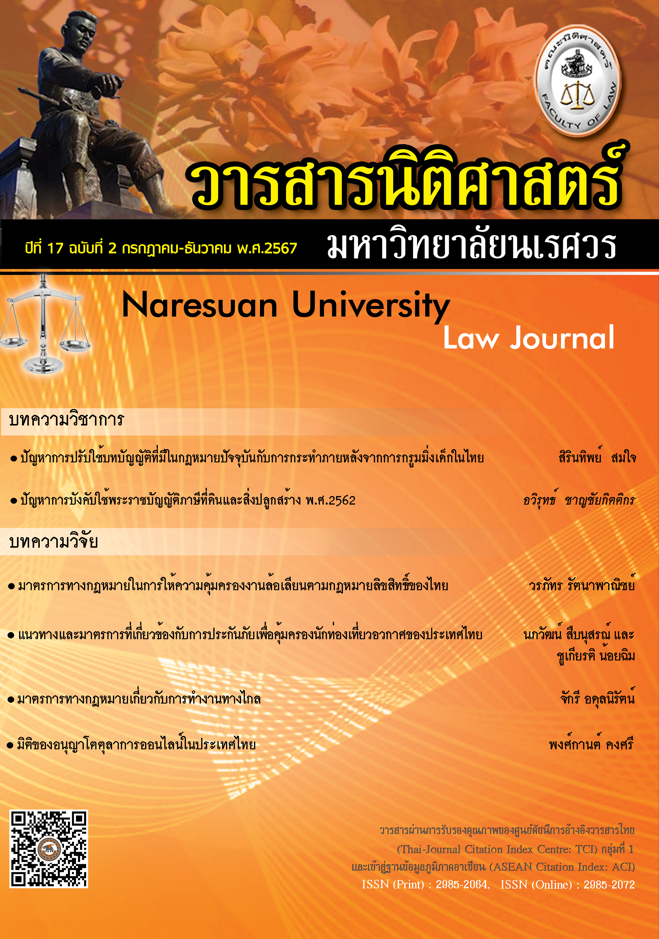มิติของอนุญาโตตุลาการออนไลน์ในประเทศไทย
Main Article Content
บทคัดย่อ
บทความวิจัยนี้ มุ่งศึกษาสภาพการณ์ปัจจุบัน อุปสรรค และแนวทางการพัฒนาอนุญาโตตุลาการออนไลน์ในประเทศไทย ซึ่งเป็นนวัตกรรมสำคัญในการระงับข้อพิพาทยุคดิจิทัล แต่การพัฒนาในบริบทของไทยยังเป็นไปอย่างจำกัดและล่าช้า เมื่อเปรียบเทียบกับต่างประเทศ ผลการวิจัยพบว่า แม้อนุญาโตตุลาการออนไลน์จะมีศักยภาพในการเพิ่มประสิทธิภาพการระงับข้อพิพาท แต่ยังมีปัญหาและอุปสรรคสำคัญหลายประการ ได้แก่ ความไม่ชัดเจนของกรอบกฎหมาย ข้อจำกัดด้านโครงสร้างพื้นฐานทางเทคโนโลยี การขาดแคลนบุคลากรที่มีความเชี่ยวชาญ และการขาดความรู้ความเข้าใจของผู้ใช้บริการ ดังนั้น บทความวิจัยได้เสนอข้อเสนอแนะเชิงนโยบายที่สำคัญ ได้แก่ การกำหนดนโยบายและยุทธศาสตร์ระดับชาติ การปรับปรุงกฎหมาย การลงทุนพัฒนาเทคโนโลยี การพัฒนาศักยภาพของบุคลากร และการสร้างความรู้ความเข้าใจให้แก่ผู้ใช้บริการ ซึ่งจำเป็นต้องอาศัยความร่วมมือจากทุกภาคส่วนในการผลักดันและขับเคลื่อนการพัฒนา เพื่อให้การอนุญาโตตุลาการออนไลน์ของไทยสามารถพัฒนาสู่ระดับสากล และเป็นกลไกสำคัญในการอำนวยความยุติธรรมทางเลือกที่มีประสิทธิภาพ อันจะช่วยสนับสนุนการเติบโตของเศรษฐกิจดิจิทัลและตอบสนองต่อความต้องการของสังคมในยุคดิจิทัลได้อย่างแท้จริง
Article Details
เอกสารอ้างอิง
Chaiwat Bunnak. Arbitration. 3rd ed., revised. Bangkok: Winyuchon, 2016. [In Thai]
Chaiyos Hemarajata. “Direction of Thai Arbitration Law in the Digital Age.” Thammasat Business Law Journal 10, no. 1 (2020): 114–134. [In Thai]
Cortés, P. The Law of Consumer Redress in an Evolving Digital Market: Upgrading from Alternative to Online Dispute Resolution. Cambridge: Cambridge University Press, 2018.
Digital Economy Promotion Agency. “Digital Development Plan for Economy and Society Phase 1 (2018-2022).” Last modified 2021. https://www.depa.or.th/th/detail-plan/digital-economy-promotion-master-plan-phase-1-2018-2022 [In Thai]
Dispute Resolution Office, Office of the Judiciary. Handbook on Filing Disputes and Objections in Arbitration 2021. Bangkok: Office of the Judiciary, 2021. [In Thai]
Electronic Transactions Development Agency. Thailand E-Commerce Value Survey Report 2020. Bangkok: Electronic Transactions Development Agency, 2021. [In Thai]
Hörnle, J. Cross-border Internet Dispute Resolution. Cambridge: Cambridge University Press, 2009.
Kaufmann-Kohler, G., & Thomas Schultz. (2004). Online Dispute Resolution: Challenges for Contemporary Justice. Alphen aan den Rijn: Kluwer Law International.
Legal Execution Department. “Challenges of Using Online Arbitration in Thailand.” Last modified 2021. http://www.led.go.th/th/node/3964. [In Thai]
Nattapon Jaikaroon. “Online Disputes Arising in the Digital Era.” Journal of Law and Technology 2, no. 1 (2020): 25-40. [In Thai]
Office of the Council of State. Council of State Memorandum on Guidelines for Amending Laws to Support Online Arbitration. Bangkok: Office of the Council of State, 2021. [In Thai]
Office of the Judiciary. “Fiscal Year 2020 Annual Report.” Last modified 2020. https://oppb.coj.go.th/th/content/category/detail/id/8/iid/156623. [In Thai]
Office of the Judiciary. “History of Arbitration in Thailand.” Last modified 2021. https://oja.coj.go.th/th/content/page/index/id/91666. [In Thai]
Office of the Judiciary. Judicial Master Plan 2022-2026. Bangkok: Office of the Judi-ciary, 2021.
Office of The National Broadcasting and Telecommunications Commission. (2020). Annual Performance Report 2020. Bangkok: Office of The National Broadcasting and Telecommunications Commission. [In Thai]
Piers, M. (2018). Virtuality and Compatibility in the Internet Era. In S. Kröll, L. A. Mistelis, P. P. Viscasillas, & V. Rogers (Eds.), Arbitration in the Digital Age: The Brave New World of Arbitration (pp. 41–62). Cambridge: Cambridge University Press.
Rabinovich-Einy, O., & Katsh, E. Digital Justice: Technology and the Internet of Disputes. Oxford: Oxford University Press, 2017.
Saowanee Asawaroj. Explanation of the Law on Evidence. 13th ed. Bangkok: Legal Education Institute of the Council of the Lawyers, 2019. [In Thai]
Securities and Exchange Commission. “Performance of the Arbitration Center in 2020.” Last modified 2021. https://www.sec.or.th/TH/Pages/LawandRegu-lations/Dispute.aspx. [In Thai]
Soonton Maneesawat. “Thailand’s Readiness in Developing Online Arbitration System to Resolve International Trade Disputes.” Consumer Protection Law Journal 13, no. 1 (2021): 1-22. [In Thai]
Thailand Arbitration Center. Annual Report 2020. Bangkok: Office of the Judiciary, 2021. [In Thai]
Thailand Digital Economy and Society Council. Thailand Digital Technology Situation and Trends Report 2021. Bangkok: Thailand Digital Economy and Society Council, 2021.
Vichai Ariyanuntaka. “Online Arbitration: Opportunities and Challenges in Thailand.” Law Journal 38, no. 2 (2020): 56-78. [In Thai]
Vichai Ariyanuntaka. Alternative Dispute Resolution: Principles and Limitations. Bangkok: Chulalongkorn University Press, 2019. [In Thai]


